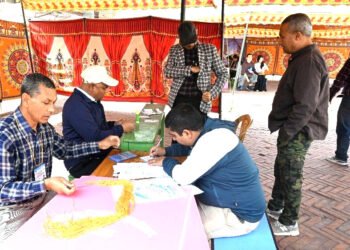WINDHOEK/NEW DELHI: Prime Minister Narendra Modi’s visit to Namibia in July 2025 was a big deal for diplomacy. It was his first visit there and the first by an Indian prime minister in almost 30 years. It also showed India’s growing role as a “strategic architect of South-South cooperation.” India is changing how it works with Africa, moving from a history of solidarity to partnerships that look to the future. This is happening at a time when Africa is quickly becoming more important on the global economic and geopolitical stage.
The visit to Windhoek, the last stop on a five-nation tour of the Global South, was full of meaning: wreaths were laid at Namibia’s Heroes’ Acre, traditional dance ceremonies were held, and an emotional tribute was paid to Namibia’s first president, Sam Nujoma. But the underlying strategy- a well-planned mix of resource security, digital influence, and developmental diplomacy—is what needs to be looked at more closely. It shows that India is changing the way it interacts with Africa in the long term.
The Next Step in Indo-African Relations: From Solidarity to Strategy
India has been involved in Africa since the mid-20th century, when it supported anti-colonial movements. India was one of the first countries to back Namibia’s independence movement and the South West Africa People’s Organization (SWAPO). In 1986, India opened SWAPO’s first office outside of Namibia. This history of political support has led to diplomatic goodwill, but Modi’s visit in 2025 shows that India is now trying to turn this goodwill into long-term strategic assets.
The Ministry of Commerce in India says that India’s overall commerce with Africa was $98.1 billion in FY 2022–23. China-Africa commerce was still much bigger than this (almost $280 billion at the same time), but India is setting itself apart with demand-driven, participatory development partnerships. India’s framework is lean, technology-driven, and built on developing institutions, as opposed to China’s model, which relies heavily on loans and infrastructure.

For Namibia, this entailed establishing a licensing deal to use India’s UPI (Unified Payments Interface) system, which was the first time this had happened in Africa. Namibia will launch UPI later this year. This will make a safe, sovereign, and real-time payments network that doesn’t depend on Western or Chinese financial platforms. This isn’t just a tech export; it’s a statement about the world. It shows that India can define digital norms and infrastructural standards in the Global South, and it also gives people in the Global South a choice between Western models that are based on monopolies and Eastern systems that are prone to surveillance.
Resource Diplomacy and Namibia’s Strategic Depth
India’s interest in Namibia goes beyond digital infrastructure. It is also based on mineral security and energy transition. Namibia has some of the world’s biggest quantities of uranium oxide and a lot of lithium, copper, graphite, and rare earth elements that haven’t been used yet. These are important for India’s goals to make electric vehicles, solar panels, and green hydrogen.
In the last few years, discoveries in Namibia’s Orange Basin have hit the news. ExxonMobil, Shell, and TotalEnergies have all started exploratory work. Geological estimations say that Namibia could be one of the top 10 oil-producing countries by 2035. India’s approach, on the other hand, is not entirely extractive; it wants to enter early through state-to-state agreements, strengthen local capacities, and make sure everyone benefits.
Modi said, “Namibia is a trusted African partner with a lot of important resources.” This was followed by talks about how to get more money into mining, petrochemicals, and energy processing. Indian businesses have already put **$800 million into Namibia**, mostly in mining areas like diamonds and zinc. As talks for a **Preferential Trade Agreement with the Southern African Customs Union (SACU)** pick up speed, India is likely to look for joint ventures and preferential access arrangements in the future.
Creating institutions, not dependencies
India’s Africa policy is different since it focuses on human development and institutional resilience. This is clear from the two Memoranda of Understanding (MoUs) that were signed during the visit. One was for setting up a “Entrepreneurship Development Centre” in Namibia, and the other was for working together in “health and pharmaceuticals.” The latter involves plans to provide generic drugs through India’s “Janaushadhi program” and maybe even help Namibia improve its ability to get medicines.
Education and skill building are two of the most important parts. India has taught more than 40,000 African professionals through the ITEC (Indian Technical and Economic Cooperation) program since 1964. Namibia has been a big winner, sending government workers and military leaders to Indian schools for training. Both sides agreed to increase ITEC scholarships and improve Namibia’s involvement in disaster resilience training and defense cooperation during the visit.
Namibia also joined two important India-led groups: the Coalition for Disaster Resilient Infrastructure (CDRI) and the Global Biofuels Alliance. It was the most recent African country to do so. These are not only ceremonial alignments; they are “platforms through which India is globalizing its development model and climate agenda,” giving African countries the chance to lead the way in creating 21st-century governance frameworks.
What this means for the Global South in terms of geopolitics
The effects stretch beyond just the two countries. India’s expanding presence in Africa, as witnessed in this visit, is part of a larger change in the Global South from “reactive diplomacy” to “coalition-building based on shared historical experiences and strategic aspirations.” India is no longer happy with just being a symbol of the South. It wants to “curate coalitions, define frameworks, and co-lead global reforms.”

Modi’s call for “reform of multilateral institutions,” such as the UN Security Council and Bretton Woods financial systems, showed that he wanted to achieve this goal. Namibia clearly backed this idea, supporting calls for “a multilateral system that reflects demographic, economic, and regional realities.”
Namibia’s criticism of the Pahalgam terrorist assault and support for India also illustrate that political trust is growing, not just for economic reasons. In an international order that is becoming more and more fragmented, these kinds of alliances between middle countries with similar postcolonial histories may influence the future of multilateralism.
A Roadmap Comes Out of Windhoek
The trip to Windhoek wasn’t only for diplomacy; it was a “strategic articulation of what a new Global South can look like.” India’s relationship with Namibia shows a “values-driven, interest-based, and future-oriented approach” that covers everything from fintech to medicines to key minerals to digital diplomacy. India will probably use this plan with other African partners in the next ten years.
This is not a race against China or the West. It is a claim that “development can be decolonized, digitized, and democratized, if those who once stood on the edges of history but now want to shape its next chapter lead the way.”
India is not going back to Africa; instead, it is moving forward with a new vision, a new plan, and a common goal for the future.
- Dr. Shahid Siddiqui is a prominent contributor and geopolitical expert for WNN. In the Global South, he works on South-South cooperation, digital diplomacy, and India’s foreign policy. Follow him on X: @shahidsiddiqui
WATCH, LIKE, SHARE & SUBSCRIBE CHANNEL FOR MORE EXCLUSIVE WORLD STORIES/INTERVIEWS



















